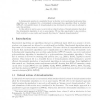SIGACT
2010
15 years 14 days ago
2010
A fundamental question in complexity theory is whether every randomized polynomial time algorithm can be simulated by a deterministic polynomial time algorithm (that is, whether B...
116
click to vote
APPROX
2008
Springer
15 years 4 months ago
2008
Springer
Abstract. Markov random fields are often used to model high dimensional distributions in a number of applied areas. A number of recent papers have studied the problem of reconstruc...
116
click to vote
FOCS
2007
IEEE
15 years 8 months ago
2007
IEEE
We design a randomized polynomial time algorithm which, given a 3-tensor of real numbers A = {aijk}n i,j,k=1 such that for all i, j, k ∈ {1, . . . , n} we have ai jk = aik j = a...
125
click to vote
STOC
2009
ACM
16 years 2 months ago
2009
ACM
We consider matrix groups, specified by a list of generators, over finite fields. The two most basic questions about such groups are membership in and the order of the group. Even...

